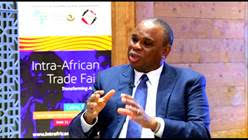Intra-regional trade can only be expected to expand economic growth and development if there is improved access to market information, Dr. Benedict Oramah, President of the African Export-Import Bank (Afreximbank), has said.
Dr. Oramah, who was speaking in Busan, South Korea, on Monday during a breakfast event organised by the Bank to promote the maiden Intra-African Trade Fair (IATF) scheduled to hold in Cairo from 11 to 17 December, said that, unlike in relatively mature markets where information on the sources and suppliers of specific goods and services were seamlessly available, the situation was different in Africa.
Most African manufacturers do not know that they could source raw materials from the continent and traders are not aware that enormous demand exist for their goods in neighbouring markets, he stated.
He cited a recent study sponsored by the Bank, in partnership with UNCTAD and the Commonwealth Secretariat, which showed that South Africa imports leather from India at double the price Ethiopia exports the same input and that Mauritius and Nigeria import leather products from Italy and Belgium at much higher costs than what South Africa and Botswana export them. Similarly, Kenya imports raw hides from New Zealand while Burundi exports the same product at a much lower price.
President Oramah described the situation as tragic, saying, “We are more familiar with other markets than our own rich market”.
Dr. Oramah said that Afreximbank was offering the Intra-African Trade Fair as a platform for networking and other forms of engagements among traders (buyers and sellers), manufacturers, financiers and policy makers, with the expectation that it would ultimately lead to actual intra-regional trade and investment deals.
He thanked the African Union and the government of Egypt for being the Bank’s partner in the endeavour.
Being the continent’s single largest trade fair and the first of its kind in decades, the fair will truly bridge the enormous trade information gap and connect major players in the continent’s trade space and identify market opportunities, he noted.
Kanayo Awani, Managing Director of Afreximbank’s Intra-African Trade Initiative, presented an overview of the trade fair, disclosing that it will feature exhibitors showcasing their goods and services and B2B meetings where business people would discuss opportunities and conclude deals. It would also include conferences and workshops with discussions on intra-African trade finance and facilitation
Afreximbank and other financial institutions will be on hand to finance deals and there would be a high-level panel for heads of state and ministers, and a conference to discuss issues affecting intra-African trade. A trade information portal would provide trade and market information and host a digital trade fair.
Also speaking at the session was Jean-Louis Ekra, former President of Afreximbank and Vice Chairman of the Advisory Council set up in support of the trade fair.
More than 80 participants, including ministers of finance, central bank governors, and representatives of global financial institutions and global, regional and national development finance institutions, attended the event.
Other collaborating institutions in the trade fair include the Pan-African Chamber of Commerce and Industry; the African Trade Policy Centre/UNECA; the World Trade Centre, Miami; the International Trade Centre; and the AfroChampions Initiative.
